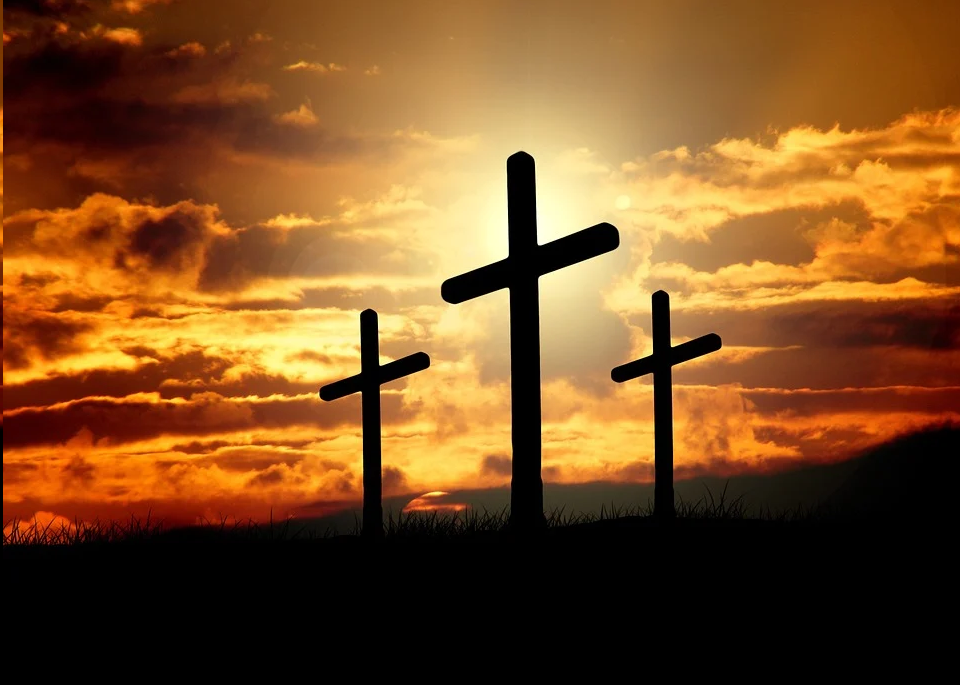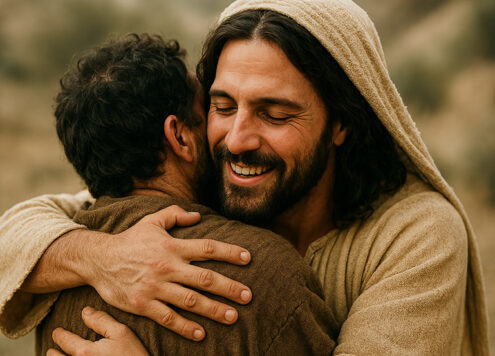A youngster was not doing well at public school. His parents got him into a strict Catholic school to see if that would improve his grades. Immediately the lad stopped watching TV and playing computer games and spent all his time at his studies. At the end of the year he was one of the best students in class getting straight A’s. His baffled parents asked him what happened. “The first day I went to that school,” he explained, “and saw that man hanging up on the cross, I knew these people meant business.”
The sight of the crucified Christ might have spurred the youngster to success, but the crucifixion is not about success the way the world views it. When Jesus grew fearful of his awesome mission before his arrest in the garden, he cried out, “ Father, if it is possible, let this cup of suffering be taken away from me.” And, just as swiftly, he added, “Not my will, but thine be done” (Matthew 26 : 39 ). It was natural even for Jesus to feel afraid in the face of his Passion. God, however, did not send His angels to rescue him, nor did He take him down from the cross.
By every observable, human standard, the Passion of Christ was a disappointing end for the One whom we acclaim as our Lord and Savior. But, there is an important lesson to be learnt from the story of Christ’s Passion. Our spiritual lives contain two essential elements : the Cross and the Crown. You cannot have one without the other. You cannot enter into the new life of the Resurrection ( the Crown ) without taking up your Cross to follow Him. The Cross or the Passion of Christ is the means of entry into the new life of the gospel. It is the means whereby we are redeemed and purified to follow Christ’s new commandment to love one another as He has loved us.
Even Peter, Jesus’s trusted disciple, rejected the Passion of Christ. He objected to Jesus going to Jerusalem and being “put to death” ( Matthew 16 : 21 ). Peter’s opposition to the Passion was so forceful that the Lord even more forcefully put him in place, “Get behind me Satan! You are judging by man’s standards, not by God’s” ( Matthew 16 : 23 )
Peter eventually got it. The Passion of Christ became his gateway to salvation. It changed his life.
Jesus has told us that His kingdom is not of this world. By this he means that the ways and standards of His kingdom are not the ways and standard of the world. One of the first people to appreciate this mystery was the repentant thief on the cross. Choking with the pains of crucifixion and imminent death, he turns and says to Jesus, hanging on the next cross, “Jesus, remember me when you come into your kingdom” (Luke 23:42). Unlike the other thief who taunts Christ, and asks to be delivered from the cross, this repentant thief knows that success in God’s kingdom is to be measured by a different set of standards.
He knows that to get into the kingdom of Christ he has to be saved not from the cross but by the cross.
How often, the followers of Christ make the same mistake as the unrepentant thief, the mistake of rejecting the cross, the mistake of shirking responsibility, the mistake of seeking to validate themselves by flashy shows of power, wealth or political connection. The passion of Christ challenges us to say no to the very attractive but one-sided worldly gospel of instant glory that offers a false hope. On the cross, Jesus is saying, there’s no glory without sacrifice, there’s no lasting love without suffering. We need to recognize that sharing in the Passion of Christ is the necessary condition for entering into the glorious, resurrected life of Christ. In the face of disappointments, bereavement, sickness, death of loved ones, ingratitude by fair-weather friends, and human failure, there is always the victory of the Cross.
The Passion of Christ is more than one individual’s suffering. It is a process through which all Christians must enter. The sins of the judges, disciples, executioners and the fickle crowd of servile sycophants, for whom Christ died, are not just past sins. They are the every-day sins we commit all the time whenever we turn our backs on Christ : whenever we condemn others and betray their trust, whenever we unleash a bitter remark or snap judgment, whenever we give into resentment, whenever we mercilessly follow the mob and take the easy way out. We are called to be more than that.
We are called to face our dark side and conquer it because Jesus overcame sin for us through his Passion.
There is a story about a knight who dragged himself back to the king’s court after a narrow escape from a wearisome campaign. The king ran out to meet him. “What is wrong, Sir Thomas?” asked the king. “My Lord,” answered the knight, “I have been out fighting your enemies to death.” “Which enemies?” asked the king? “Your enemies on the western border,” replied the knight. “But,” countered the king, “I have no enemies on the western border.” “Well,” replied the disillusioned knight, “now you do.”
In his zeal to serve his Lord, the knight had been going about sowing seeds of enmity in a kingdom he was supposed to be defending. The kingdom you need to be defending is Christ’s kingdom. Unlike the hapless knight, you need to accept Jesus’s challenge to ” take up your cross and follow” Him, if you want to avoid so terrible a mistake.
Let us not make the same mistake as the disillusioned knight who sowed the seeds of enmity rather than the seeds of love in the Lord’s Kingdom. Jesus suffered and died on the cross for the forgiveness of our sins so we could follow his example of loving one another as He has loved us.
Never forget that.
The repentant thief got is right. He accepted Jesus, crucified, who offered His life for his redemption on the Cross.
—Fr. Hugh Duffy











5 Comments
Tom Walsh
Thank you Fr. Hugh for taking the time to share your thoughts and wisdom with us, as we seek to find the love our hearts yearns for daily. Tom
Ellen Mongan
May God continue to inspire you to feed the multitudes. May are hungry and feeding on a feel good gospel. A Savior who hung on a cross to bring us eternal life does not appeal to them. Suffering embraced brings you face to face with God’s Grace.
John Duffy
Well done Fr. Hugh a beautiful reflection on the Passion. The scriptural narratives in all Gospel’s tell us of the total shattering of the understanding the Apostles had about this man they had left everything to follow only to be told He had to undergo the cruelest of death’s to achieve His purpose namely the salvation of God’s creation.
“Mans way’s are not God’s Ways.”
Erin M DesPres
Amen!!!
Tom Rooney
Thank you Father Duffy it’s easy to see why the apostles wanted a much different outcome before the crusifiction